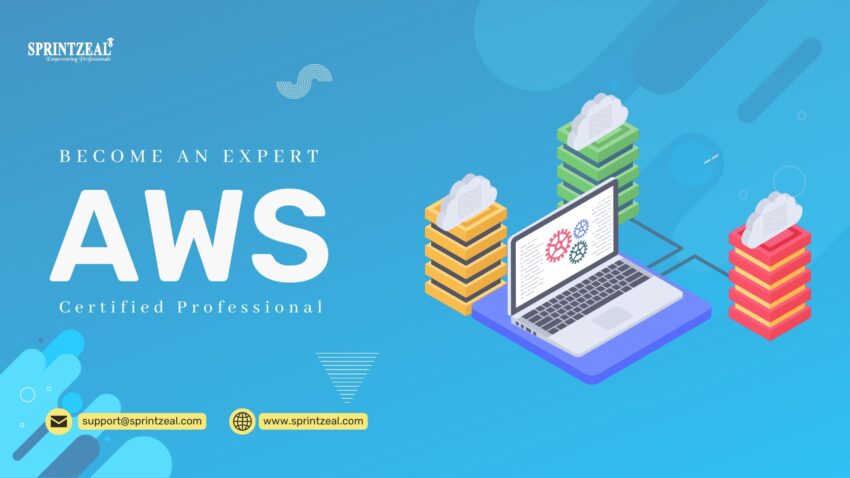In today’s digital landscape, cloud computing has become an indispensable part of the tech industry. Among the various cloud service providers, Amazon Web Services (AWS) stands out as a leader, offering a vast array of services and solutions. As more businesses transition to the cloud, the demand for skilled AWS professionals continues to soar, making AWS certifications a valuable asset for individuals seeking to advance their careers in cloud technology.
Understanding AWS Certification
What Are AWS Certifications?
AWS certifications validate an individual’s expertise and proficiency in designing, deploying, and managing applications on the AWS platform. These certifications cover a wide spectrum of cloud-related skills, catering to different roles and levels of expertise. They are designed to test practical knowledge, hands-on experience, and understanding of AWS services across various domains.
Why Pursue AWS Certification?
Career Advancement:
Earning an AWS certification can significantly boost your career prospects. It demonstrates your dedication, skills, and credibility to potential employers, increasing your chances of landing lucrative job opportunities in the competitive tech industry.
Skill Validation:
Through rigorous exams and practical assessments, AWS certifications validate your skills and knowledge, providing you with a recognized credential that showcases your expertise in cloud computing.
Keeping Pace with Technology:
The cloud industry evolves rapidly, introducing new services and technologies. Pursuing AWS certifications helps professionals stay updated with the latest trends and advancements in the field.
AWS Certification Paths
AWS certifications are categorized into different paths, each catering to specific roles and expertise levels. The current certification paths include:
-
Foundational Level:
- AWS Certified Cloud Practitioner: Ideal for beginners, focusing on foundational cloud concepts and AWS services.
-
Associate Level:
- AWS Certified Solutions Architect – Associate: Covers designing and deploying scalable systems on AWS.
- AWS Certified Developer – Associate: Focuses on developing and maintaining applications on the AWS platform.
- AWS Certified SysOps Administrator – Associate: Concentrates on operations and system administration tasks on AWS.
-
Professional Level:
- AWS Certified Solutions Architect – Professional: Targets advanced skills in designing distributed systems and applications on AWS.
- AWS Certified DevOps Engineer – Professional: Emphasizes advanced skills in implementing and managing continuous delivery systems on AWS.
-
Specialty Certifications:
- AWS Certified Security – Specialty: Focuses on securing the AWS platform and implementing security best practices.
- AWS Certified Advanced Networking – Specialty: Concentrates on designing and implementing AWS networks.
- AWS Certified Machine Learning – Specialty: Covers designing, implementing, and deploying machine learning models on AWS.
Preparing for AWS Certification
Prerequisites:
While there are no strict prerequisites for most AWS certification, having a basic understanding of cloud concepts and experience working with AWS services can be advantageous.
Study Resources:
Numerous resources are available to help prepare for AWS certification exams:
- AWS Documentation: Official AWS documentation provides in-depth information about services and best practices.
- Online Courses: Platforms like AWS Training and Certification, Coursera, Udemy, and A Cloud Guru offer comprehensive courses tailored to each certification.
- Practice Exams: Mock exams and practice questions simulate the real exam environment and help assess your readiness.
Hands-on Experience:
Hands-on experience is crucial for success in AWS certifications. Creating and deploying projects on AWS, experimenting with various services, and troubleshooting issues are invaluable learning experiences.
Registering and Taking the Exam
Exam Details:
AWS certification exams are administered by PSI, a global testing provider. Exams are typically multiple-choice and available in various languages.
Exam Readiness:
Before scheduling the exam, ensure thorough preparation. Review the exam guide, assess your knowledge using practice tests, and allocate sufficient time for revision.
Scheduling the Exam:
Register for the exam through the AWS Training and Certification portal. Select a convenient exam center or opt for an online proctored exam.
Exam Day:
Arrive early for an in-person exam or ensure a stable internet connection and setup for online proctored exams. Follow the instructions provided to start the exam.
Post-Exam and Certification
Exam Results:
After completing the AWS exam, you’ll receive immediate feedback on whether you passed or failed. Official exam results and certification status can be viewed on the AWS Training and Certification portal.
Certificate Validation:
Upon successfully passing the exam, you’ll receive a digital badge and a certification document. These can be shared on professional networking platforms like LinkedIn to showcase your accomplishment.
Continuing Education:
AWS certifications are valid for three years. To maintain certification status, professionals can either retake the current exam or pursue a higher-level certification. Additionally, participating in continuous learning through webinars, workshops, and AWS re:Invent conferences helps in staying updated with the latest AWS advancements.
Conclusion
AWS certifications from sprintzeal serve as a testament to your expertise and proficiency in leveraging AWS services. Whether you’re starting your cloud computing journey or aiming to advance your career, obtaining an AWS certification can open doors to exciting opportunities in the ever-evolving tech industry. By understanding the certification paths, preparing diligently, and gaining practical experience, you can embark on a fulfilling and rewarding journey towards becoming a certified AWS professional.


